TikTok video sizes shape how your content looks and performs from the first swipe. The platform’s vertical video format changed the way people watch, create, and share. As Statista points out, from quick dances to Gen Z’s fast commentary, TikTok drives mobile-first viewing, fast-scrolling feeds, and new types of video ads.
If your TikTok video sizes are off, visuals blur, text gets cut, or you see black borders, even great content can look wrong. For creators, marketers, and brands, the right TikTok video dimensions and aspect ratio make content fit the feed.
TikTok users scroll fast. Videos sized for TikTok get noticed, while the wrong format or layout can push even strong messages out of view. The right video sizes and dimensions help your content stand out.
Before adding music, editing, or captions, your video’s shape tells viewers to stay or scroll. Matching the platform’s format starts your TikTok visibility.
Types of TikTok Videos
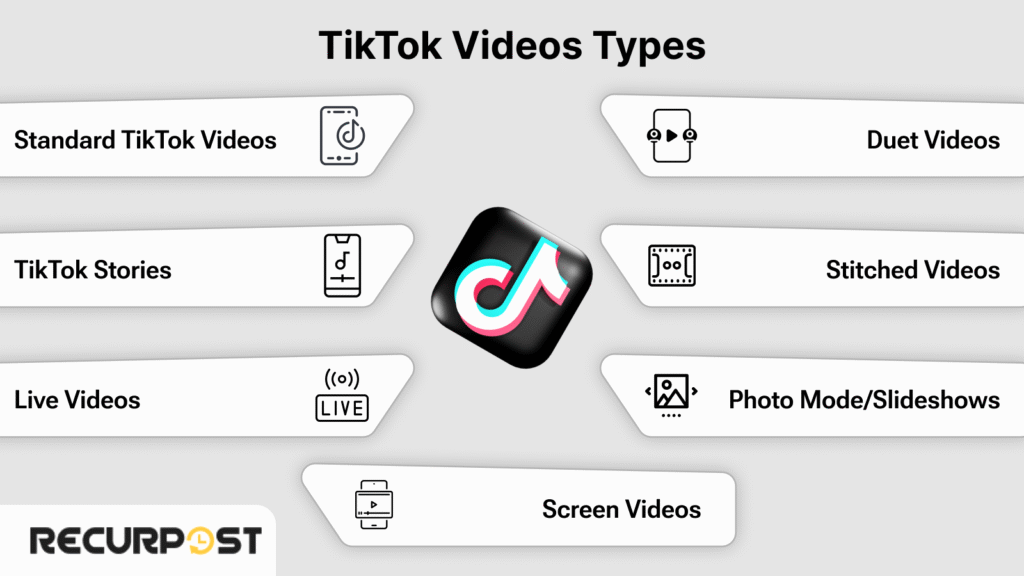
TikTok supports many video types, each built for vertical videos and using the right format, video size, and aspect ratio. TikTok users create content in these categories (not just paid placements):
1. Standard TikTok Videos
These regular videos show up in the main feed. The best TikTok video sizes use portrait orientation in MP4 or MOV file format with a 1080 x 1920 pixels resolution.
2. TikTok Stories
Stories are 24-hour vertical videos that show on profile icons. These are ideal for short updates or behind-the-scenes clips and use the same video dimensions.
3. Live Videos
Live streams allow for real-time interaction with filters and comments. They must be vertical, using the standard TikTok video format.
4. Duet Videos
This split-screen format lets you pair your video with another user’s. The final upload still fits the 9:16 aspect ratio.
5. Stitched Videos
Combine a segment of another creator’s video with your own. These keep the original TikTok video dimensions for the best fit.
6. Photo Mode or Slideshows
Upload portrait images in a scrollable format. The right file size and frame rate make for smooth playback.
7. Screen Videos
With TikTok effects, you can record yourself over photos or videos. These also export as vertical videos using the same video specs.
Every TikTok video type needs the correct TikTok video sizes and aspect ratio for the best viewing experience.
Types of TikTok Video Ads

TikTok video ads let brands reach the right target audience with content that blends into the TikTok feed. Every ad format needs the correct video dimensions, format, and aspect ratio to look natural and perform well.
1. In-Feed Ads
These show up in the main feed between regular videos. Use vertical videos with a 9:16 aspect ratio and formats like MP4 or MOV. The best TikTok video sizes help add clear CTAs such as “Shop Now.”
2. TopView Ads
TopView ads auto-play when the TikTok app opens. These support full-screen portrait videos up to 60 seconds and need high video resolution for best results.
3. Branded Hashtag Challenges
These invite TikTok users to join trending challenges, showing up on the Discover page. Your videos should follow the right TikTok video specs and use portrait mode.
4. Branded Effects
Branded effects add custom stickers or filters that creators use. They work best with supported video formats and file types such as MOV files.
5. Spark Ads
Spark ads boost videos already on TikTok. They keep the original video format, aspect ratio, and video quality for better reach and more viewer engagement.
A Quick Cheat Sheet Guide to TikTok Video Ad Specs
| Ad Type | Aspect Ratio | Resolution | Video Length | Full Size | File Format | Frame Rate |
| In-Feed Ads | 9:16, 1:1, 16:9 | 1080×1920 pixels | 5 to 60 seconds | Android: 72 MB, iOS: 287 MB | MP4, MOV, MPEG, AVI, 3GP | Up to 60 fps |
| Branded Effects | Varies by effect usage | |||||
| Spark Ads | 5 to 60 seconds | |||||
| TopView Ads | 9:16 | Up to 60 seconds | ||||
| Branded Hashtag Challenges | 15 to 60 seconds |
What Are the Ideal TikTok Video Sizes in 2026?
Getting TikTok video sizes right still follows one main rule: vertical videos win. The current TikTok video resolution standard is 1080 x 1920 pixels, which continues to be the recommended size in every TikTok video size guide. These video dimensions fill the entire screen on most mobile devices, giving your video content a natural, full-screen experience that improves viewer engagement.
Here’s what TikTok officially supports for video uploads:
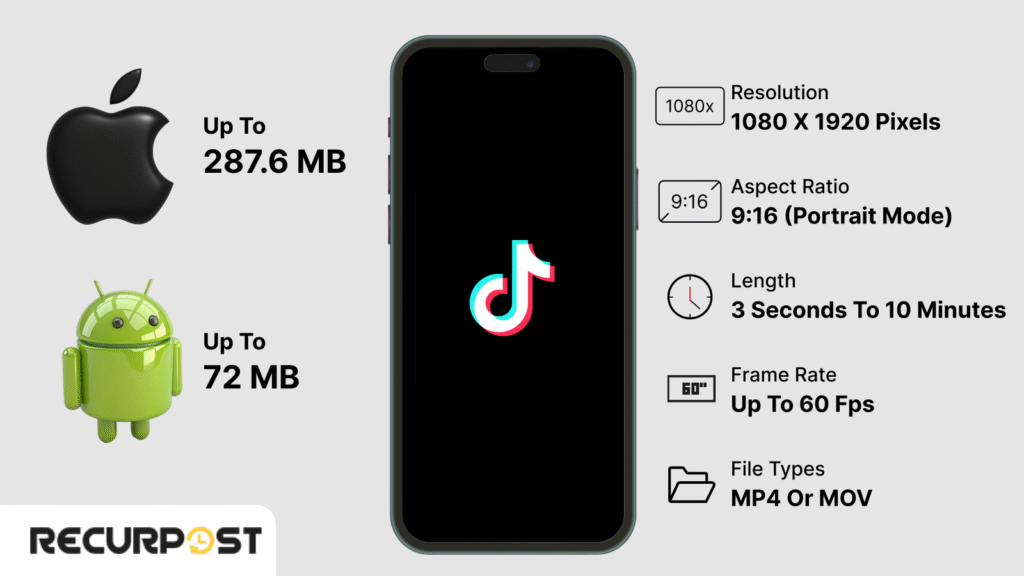
- Resolution: 1080 x 1920 pixels
- Aspect Ratio: 9:16 aspect ratio (portrait orientation)
- Minimum Length: 3 seconds
- Maximum Length: 10 minutes
- Frame Rate: Up to 60 fps (frames per second)
- File Types: MP4 and MOV
- Maximum File Size:
- Android devices: Up to 72 MB
- iOS devices: Up to 287.6 MB
Always use portrait mode for your TikTok videos to match the platform’s vertical viewing preference. While square videos or landscape videos are possible, they display with black bars or borders that reduce your video’s impact unless you’re repurposing content for multiple social media platforms.
Choosing the correct format, file size, and video aspect ratio helps your videos upload smoothly and perform well in the TikTok feed. Staying within the recommended TikTok video size specifications also keeps your videos sharp, reduces compression, and avoids playback issues.
TikTok Thumbnail and Cover Image Specifications
TikTok thumbnail dimensions use the same 1080 x 1920 pixels format as regular videos, since TikTok cover images are auto-generated from video frames. The standard TikTok cover size sticks to a 9:16 aspect ratio, matching the platform’s vertical orientation. This setup lets creators pick any frame as a thumbnail for display in the feed.
Using the correct video format helps with easy uploading, smooth playback performance, and a crisp full-screen experience, important for both regular posts and in-feed video ads. If you want to know the TikTok video size in inches, 1080 x 1920 pixels is about 2.25 x 4 inches on most mobile devices. Still, pixel dimensions are the standard for editing and exporting video content on TikTok.
Portrait vs. Landscape vs. Square: Which TikTok Aspect Ratio Works Best?
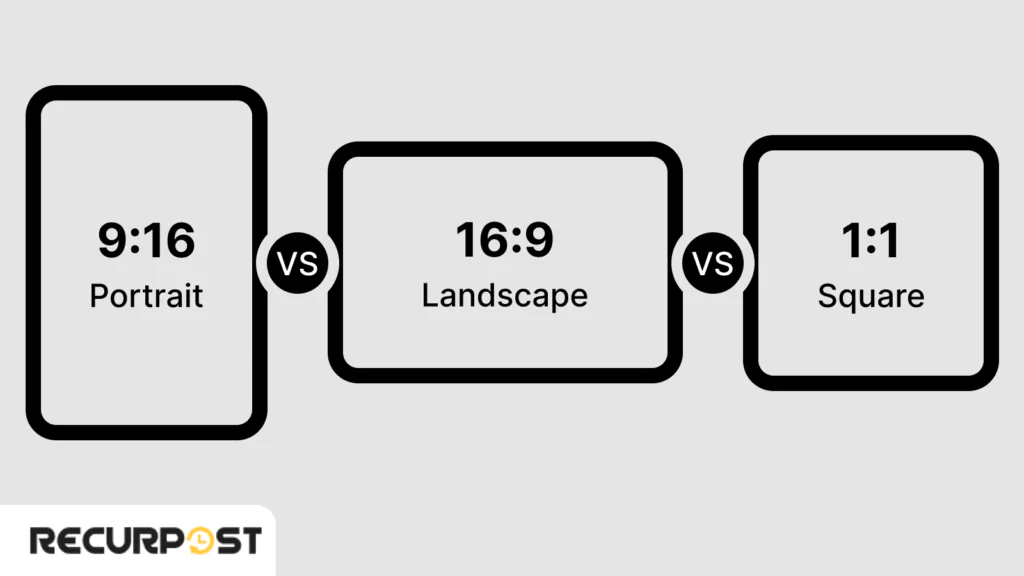
TikTok video sizes and aspect ratios shape how content fills the screen. TikTok centers on portrait orientation, and the ideal TikTok video aspect ratio is 9:16, tall, narrow, and perfect for mobile viewing on most smartphone screens.
Other supported video formats and sizes include:
- 1:1 (Square video): Acceptable, but leaves empty space (black bars) above and below your video content.
- 16:9 (Landscape videos): Great for YouTube or other social media platforms, but they show with borders on TikTok, limiting viewer engagement.
These formats can be uploaded to TikTok, but don’t blend seamlessly into the feed. Square formats and landscape modes often look recycled or out of place, lowering watch time and engagement. When repurposing for TikTok, use video editing software to resize or reframe content.
Portrait videos always deliver the best viewing experience. When your video matches the platform’s vertical viewing style, it feels designed for TikTok, leading to better results with the TikTok algorithm and more user participation.
How TikTok Video Sizes Align with Other Social Media Platforms
TikTok video sizes use a vertical format that lines up with other mobile-first social media platforms, making it easy to repurpose video content for multiple platforms. When you use the default TikTok video dimensions your content fits almost everywhere with no extra editing.

Here’s how TikTok’s video specs match up with other networks:
- Instagram Reels: Uses the same 1080 x 1920 size and vertical orientation
- YouTube Shorts: Follows the 9:16 portrait mode for mobile devices
- Facebook Reels & Snapchat: Both favor full-screen vertical viewing
- Pinterest Idea Pins: Push for vertical videos to boost engagement
Using the standard TikTok video sizes means your video files stay sharp and fill the entire screen across channels. No extra resizing, compression, or awkward borders.
For creators running multiple social media profiles, TikTok video sizes are the base format for cross-platform posting. This keeps your content quality high, saves time in video editing, and lets your videos blend naturally into every feed.
Why TikTok Video Format Matters
TikTok video sizes and video format directly impact how your content appears and performs. The wrong format can lead to upload issues, playback glitches, or even rejected files. TikTok checks every detail in your video specs, and any mismatch may delay posting or cause visible quality loss.
Here’s what to keep in check:
- File Format Compatibility: Use MP4 or MOV file types for TikTok to prevent conversion errors and keep your video uploads smooth.
- Bitrate & Compression: Large files, heavy filters, or high bit rates trigger auto-compression, which may reduce video quality.
- Frame Rate Limits: Anything above 60 fps isn’t supported and could cause skipping or failed uploads.
- Aspect Ratio Fit: Incorrect video dimensions force TikTok to crop your video or add black bars, hurting the viewing experience.
- Audio Codecs: Stick with AAC audio for clean sound. Using unsupported audio formats can cause sync problems or muted videos.
Even small changes to your video file size, frame rate, or format can lead to upload problems. Choosing the correct TikTok video format from the start keeps your content sharp on all devices, reduces editing headaches, and improves playback performance across the platform.
Common Mistakes with TikTok Video Dimensions
Skipping the right TikTok video sizes leads to weak video quality, failed uploads, and poor viewer retention. Most errors come from mismatched video dimensions, unsupported file formats, or sloppy edits.
- Using horizontal videos instead of vertical videos: The TikTok vertical feed is built for portrait orientation. Uploading a landscape video adds black bars, making your video look smaller and less engaging on mobile devices.
- Choosing the wrong file format: While TikTok supports MP4, MOV, MPEG, and 3GP, using MP4 or MOV files gives the best playback performance. Unsupported file types can trigger upload errors.
- Ignoring video file size limits: Maximum file size is 72 MB for Android devices and 287.6 MB for iOS devices. Large video files get compressed, lowering video quality and slowing the upload process.
- Skipping video resolution checks: If your video editing software exports in low quality, your TikTok videos will look blurry. Always use the ideal TikTok video size(1080 x 1920 pixels) with the correct aspect ratio (9:16).
- Leaving text outside the safe zone: Feed TikTok video ads and in-feed video ads add interface layers. Captions or text too close to the edge may be cut off in the TikTok app.
- Forgetting to resize videos when repurposing: Square videos or clips with odd aspect ratios might crop or distort. When you edit TikTok videos for upload, check if resizing matches TikTok video specs.
- Using over-complicated video editing software: Some tools add watermarks or change frame rates. Stick with video editing software that outputs the supported formats and the right frame rate for TikTok.
TikTok users aiming to stand out should treat video size, resolution, and file format as the foundation for success. Choosing the right TikTok video format from the start leads to better results on the platform.
How to Get More Followers on TikTok
Best Practices for TikTok Video Sizes & Formats
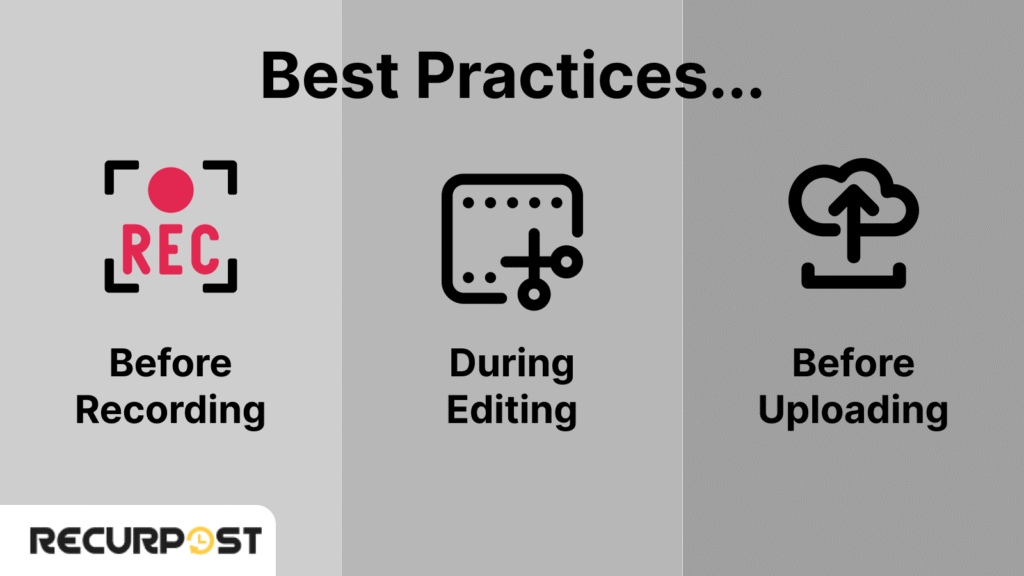
Getting TikTok video sizes right starts before you hit record. Each setup and export step affects how your video content appears on the TikTok app. Using the correct video specs prevents format, playback, and feed problems.
Before Recording
- Set video resolution to 1080 x 1920 pixels for a full-screen look in TikTok’s vertical feed.
- Stick to portrait mode; using a landscape video shrinks your frame and hurts the viewing experience.
- Film with mobile devices held upright to capture the ideal TikTok video size.
- Choose vertical videos with the expected TikTok video aspect ratio (9:16) for best results.
During Editing
- Pick video editing software that supports MP4 or MOV formats.
- Check your video’s aspect ratio. It must be 9:16 to prevent cropping.
- Keep overlays, text, and effects away from the edges for clean playback.
- Set the frame rate up to 60 fps as TikTok supports.
- Preview your video dimensions before export to lock in video quality.
- Avoid editing in formats like MPEG or 3GP unless your device compatibility demands it.
Before Uploading
- Keep video file size under TikTok’s limits: 72 MB (Android devices) or 287.6 MB (iOS devices).
- Use editing software that can compress videos while keeping clarity.
- Make sure your final video format is MP4 or MOV for smooth uploads.
- Test playback performance before posting to check video resolution, video length, and frame rate.
- Preview to ensure your video content looks right. No UI overlap, crisp frame, ready for feed TikTok video ads, in-feed video ads, and organic content.
Following these steps gives you TikTok videos that fit the feed, pass technical checks, and look good across all mobile devices and social media platforms.
How RecurPost Simplifies TikTok Video Publishing
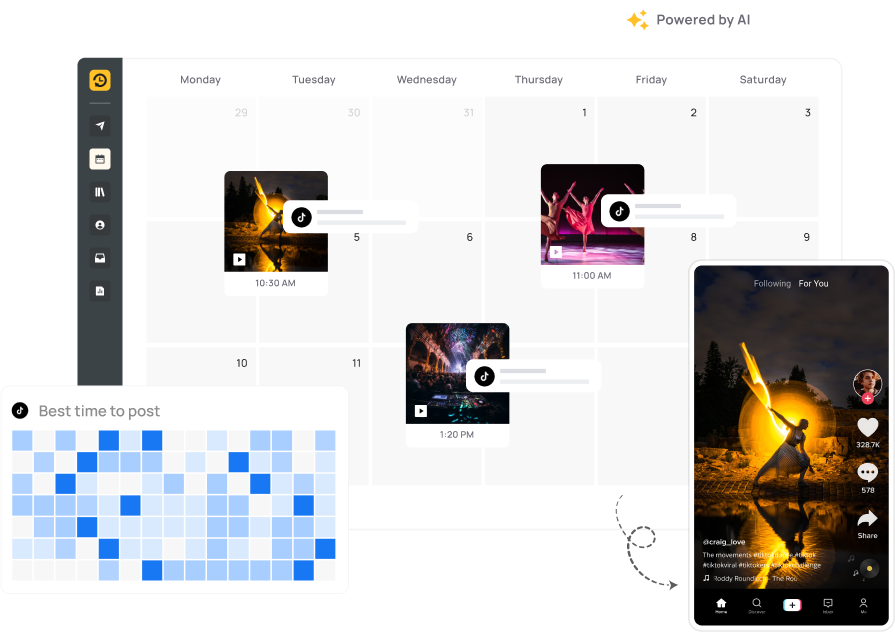
RecurPost makes sharing TikTok videos easy for creators and brands. The platform takes care of all the TikTok video sizes, corrects formats, and times your posts without extra editing or manual setup.
- Supports MP4, MOV, MPEG, and 3GP formats for smooth video uploads
- Matches TikTok video sizes and the 9:16 aspect ratio for full-screen vertical videos
- Keeps your video file size, video resolution, and video length inside TikTok’s limits. 72 MB for Android devices and 287.6 MB for iOS devices
- Lets you reschedule top TikTok videos for other social media platforms, including square video or landscape formats
- Protects video quality when you reuse TikTok video ads or in-feed video ads.
- Works seamlessly across all mobile devices, including those running Android.
With RecurPost, your video content always uses the right video format, video dimensions, and specs. This means you can publish on the TikTok platform and beyond, without needing to check specs or worry about the technical side.
Final Tips for Smart Video Publishing
Before posting, always check your TikTok video sizes against the latest TikTok video specs. Small tweaks keep your content crisp and ready for the feed.
1. Open the TikTok app and preview your video’s aspect ratio to make sure it fills the whole screen.
2. Stick with MP4 or MOV formats for the smoothest video uploads on all mobile devices.
3. Keep your video length short for faster watch-throughs. Shorter videos boost viewer engagement.
4. Review your video dimensions, video resolution, and file size. Even compressed videos under the maximum file size should look sharp.
5. Double-check that your portrait videos match the TikTok aspect ratio (9:16) and never look like square video or horizontal video cuts.
6. Use video editing software that maintains the right frame rate, especially for MOV formats or when exporting from Android devices.
7. For TikTok video ads or feed TikTok video ads, preview your captions, and make sure text won’t get covered by UI elements.
TikTok rewards content that fits the screen. Choosing the right TikTok video sizes and format helps your video content feel native, polished, and discoverable on any social media network.
Summing Up
TikTok video sizes are more than technical details. They’re the foundation for TikTok visibility. Each frame, second, and format choice shapes how your video content connects with the TikTok audience.
Don’t let your videos suffer from cropped edges, blurry video resolution, or poor playback performance. Whether you’re sharing how-to tips, running TikTok ads, or building a brand on the platform, keeping TikTok video sizes consistent means your message stands out.
TikTok favors content created for its platform. Use this to your advantage: create, adjust, and post videos that match the feed. The right video sizes do more than fill the screen; they make your content feel native, clear, and built to win on TikTok.
FAQs on TikTok Video Sizes
1. Can I upload TikTok videos in 4K resolution?
No, TikTok currently downscales 4K videos to 1080p. While shooting in 4K can help with editing, uploading at 1080 x 1920 pixels gives the best playback performance and stays within TikTok video sizes and video size limits.
2. What’s the best aspect ratio for TikTok Duets and Stitches?
Even for split-screen layouts like Duet videos and Stitched videos, keep your final export in a 9:16 aspect ratio. TikTok adjusts the layout automatically, but always use portrait video dimensions in your editing software to avoid format errors.
3. Does TikTok compress my video after upload?
Yes. TikTok applies automatic compression to large or high-bitrate video files during the upload process. Using the right file format (like MP4 or MOV) and keeping your file size manageable helps maintain video quality.
4. Can I upload TikTok videos using desktop tools or browsers?
Yes. The TikTok desktop upload tool at www.tiktok.com/upload supports video uploads using the same video specs as the app. You can drag and drop MP4 or MOV files, but some editing features are limited compared to the mobile app.
5. How do TikTok video sizes impact video editing and compression?
TikTok video sizes set the baseline for editing and compression. Sticking to 1080 x 1920 pixels and MP4 or MOV format keeps file size manageable and playback quality high.
6. What’s the best TikTok video size for user-generated content and branded videos?
TikTok video sizes should always follow the 9:16 aspect ratio for both user-generated content and branded videos. Using these specs ensures your video content looks sharp and fits every mobile device.
7. Can I use landscape or square videos for TikTok video sizes?
TikTok video sizes work best in portrait mode, but landscape and square videos are supported. However, these formats may add black bars and reduce engagement.
8. Does TikTok video size affect how ads display on mobile devices?
Yes, TikTok video sizes must match the correct aspect ratio for ads to fill the screen on mobile devices. Wrong sizes can shrink your video or add borders.
9. How does file type relate to TikTok video sizes?
Always use MP4 or MOV for the best TikTok video sizes. Unsupported file types can lead to upload errors or quality loss.
10. Are TikTok video sizes the same for all social media platforms?
No, TikTok video sizes are optimized for TikTok’s vertical feed, while other social media platforms may use different video dimensions. Adjust your content or use editing software to match each platform.

Ruchi Dhimar is a skilled content writer with 5 years of experience. She is passionate about crafting compelling narratives, specializing in writing content for different industries.





